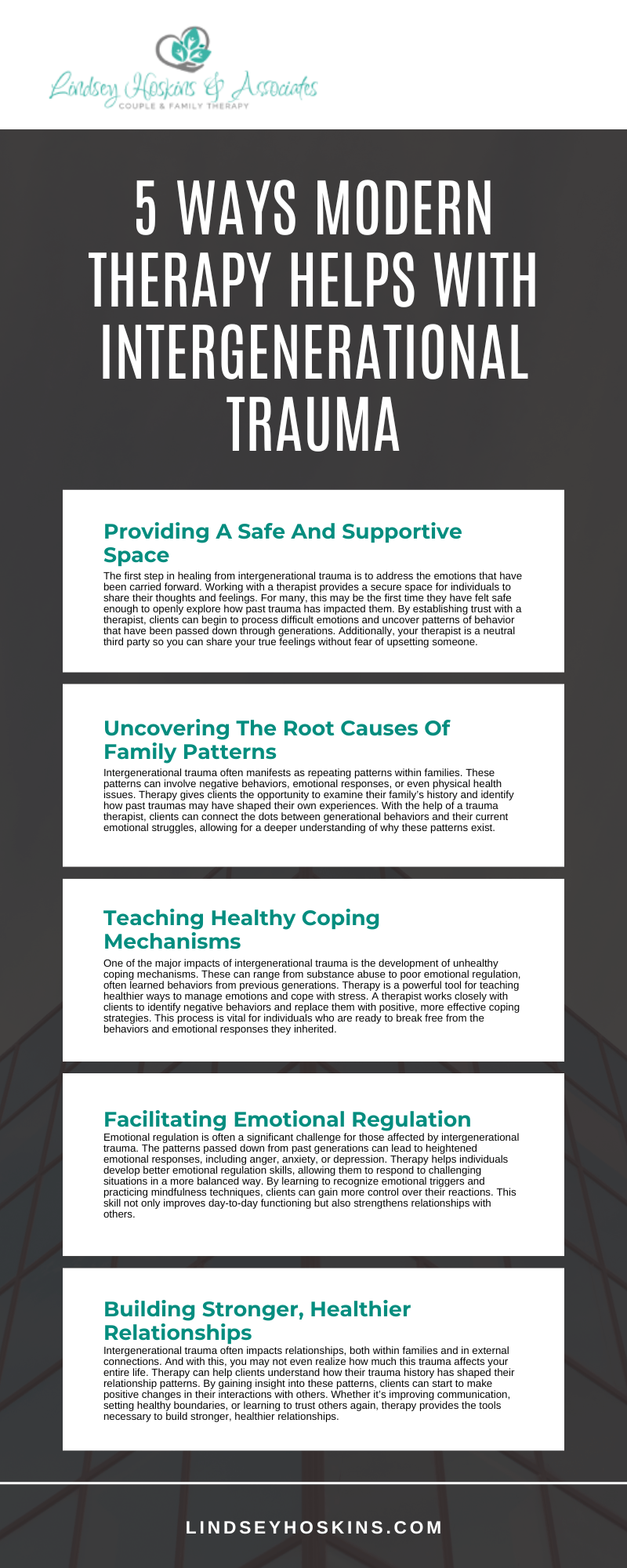Is unresolved trauma preventing you from living your best life? Are you struggling with relationships or having difficulty forming attachments because of trauma in your past? Many of us may not realize that feelings of sadness, emptiness, or simply being overwhelmed and paralyzed with indecisiveness may be stemming from trauma from the past that you never fully resolved.
We can help you. Trust the compassionate team from Lindsey Hoskins & Associates to give you the personalized support you need to identify the root of trauma in your life and resolve it in a healthy way. Your mental health and well-being are critical to your success and peace in life. Our insightful Silver Spring, MD, trauma therapist can help you with the right support and therapy approach to help you manage your responsibilities and improve your relationships with friends and loved ones. We can help you find closure and move on with confidence. Contact us today to learn more about our trauma therapy options. We offer evening and weekend appointments for your convenience.
Reach Out To A Silver Spring Trauma Therapist
Do you have trouble regulating your emotions? Perhaps you lack healthy coping skills or struggle with self-destructive behaviors. Your current state of mental health may be due to neglect or abuse you suffered in the past. This often metastasizes into unresolved trauma, and the effects can present in unhealthy ways.
If you’ve tried to “deal with it” on your own, but “dealing with it” isn’t working anymore, then maybe it’s time to reach out to our trauma specialist. If you’re constantly telling yourself, “It’s no big deal,” or wondering why you can’t seem to get over past abuses or mistreatment, then you can benefit from personalized trauma therapy. Our professionally trained therapists are here to help normalize what you went through, big or small, and process and resolve the aftereffects of the trauma. We also help you develop healthier ways to deal with stress in your life, including identifying and regulating your emotions.
Unresolved Trauma Is Far More Common Than Most People Realize
You may think of “trauma” as being abused as a child or living through something violent and drastic, like going to war or an attack of extreme violence. In truth, trauma refers to many more common situations that have lasting effects on our lives. If you are a child of neglectful or substance-abusing parents, if you suffer from chronic illness or physical pain, if you’ve been emotionally neglected, or if you’re going through a major life change, like death or divorce, then you likely experienced trauma.
Many people have trauma from the environment they grew up in. A chaotic or uncertain living situation or a combative family environment can leave lasting scars from childhood that manifest themselves as trauma in adulthood. Therapy centers around helping you become more capable of responding to life’s challenges and helping you better manage them. It won’t remove what happened to you, but it can help you overcome it and open a world of possibilities.
If you are curious about trauma therapy or wonder how our Silver Spring trauma therapist could help you, please call us. Lindsey Hoskins & Associates provides personalized trauma therapy for adults and children, and we work with you to develop the right plan and approach to help you live a healthier, happier life.
Trauma Is Difficult, Don’t Try To Deal With It Alone
Trauma is a heavy burden to carry, and trying to process it alone can make the healing journey even more difficult. Many people believe that they can push through, overcome, or eventually forget traumatic experiences without seeking help. However, this often results in unresolved emotional pain that may resurface later in life. While it might seem strong to go through trauma on your own, reaching out for support is a critical part of the healing process, especially when those wounds are invisible.
The Importance Of Acknowledging Trauma
The first step to healing from trauma is acknowledging its impact. Trauma can stem from a wide range of experiences, such as abuse, accidents, natural disasters, or sudden loss. No matter the source, the emotional and psychological effects of trauma can be long-lasting. Without proper support, people may struggle with anxiety, depression, or post-traumatic stress disorder (PTSD). Some might even turn to unhealthy coping mechanisms, such as substance use, to numb the pain.
Attempting to suppress or ignore trauma often leads to more harm than good. By confronting and processing these feelings with the guidance of a professional, individuals can begin to heal and find healthier ways to move forward. Our trauma therapist can offer tools and strategies that make the path to recovery more manageable and sustainable. Our specially trained clinicians are ready to work with you in a safe environment to overcome your trauma.
Why Professional Support Is Key
Many people hesitate to seek individual therapy for trauma, either because they feel ashamed, believe they should handle it on their own, or are uncertain about how therapy can help. However, professional therapists are trained to provide a safe, non-judgmental space where individuals can express their feelings and experiences openly.
Working with a therapist allows people to explore their trauma at their own pace, with guidance tailored to their specific needs. Therapists use different therapeutic approaches, such as cognitive behavioral therapy (CBT), eye movement desensitization and reprocessing (EMDR), and talk therapy, to help individuals work through their emotions and develop healthier coping strategies.
Therapy is not about simply reliving painful memories; it’s about learning how to process and integrate these experiences into a healthier emotional framework. Professionals can attest to the fact that, through therapy, individuals can regain control over their lives and find peace after trauma; this is why working with one of our trained, certified clinicians is very important.
The Benefits Of Seeking Help
Healing from trauma is not something that happens overnight, but seeking support early can prevent long-term emotional damage. With our therapist, individuals can:
- Learn to identify and manage trauma-related triggers
- Build emotional resilience
- Improve relationships by addressing how trauma affects interpersonal interactions
- Gain a better understanding of their own emotional responses
- Develop coping mechanisms that work for them in the long term
Addressing trauma in a safe environment can also reduce the chances of developing more serious mental health issues down the road. Therapy helps individuals recognize their progress, celebrate small victories, and gain the confidence to continue healing.
Reach Out For Support
Trauma doesn’t have to define your life. Seeking help is a sign of strength, and no one should have to go through it alone. If you’re dealing with unresolved trauma, reaching out to our therapist can be the first step toward healing. At Lindsey Hoskins & Associates, our team is dedicated to providing compassionate support to those working through traumatic experiences.
If you or a loved one is struggling with trauma, we encourage you to take the next step and reach out for help. Therapy offers a safe space to begin processing your feelings and reclaiming your emotional well-being. Don’t hesitate to contact us and explore how we can assist you on your path to healing. Reach out today!
5 Ways Modern Therapy Helps With Intergenerational Trauma
At Lindsey Hoskins & Associates, we recognize how intergenerational trauma can shape individuals and families. This type of trauma is passed down through generations and can deeply affect mental health, relationships, and overall well-being. It’s not uncommon for people to feel stuck in harmful patterns that they aren’t fully aware of. Fortunately, modern therapy with our Silver Spring, MD trauma therapist provides effective tools and techniques to help individuals heal from intergenerational trauma. Here are five ways therapy can assist in breaking the cycle of trauma and fostering long-term healing.
1. Providing A Safe And Supportive Space
The first step in healing from intergenerational trauma is to address the emotions that have been carried forward. Working with a therapist provides a secure space for individuals to share their thoughts and feelings. For many, this may be the first time they have felt safe enough to openly explore how past trauma has impacted them. By establishing trust with our therapist, clients can begin to process difficult emotions and uncover patterns of behavior that have been passed down through generations. Additionally, our therapist is a neutral third party so you can share your true feelings without fear of upsetting someone.
2. Uncovering The Root Causes Of Family Patterns
Intergenerational trauma often manifests as repeating patterns within families. These patterns can involve negative behaviors, emotional responses, or even physical health issues. Therapy gives clients the opportunity to examine their family’s history and identify how past traumas may have shaped their own experiences. With the help of our trauma therapist, clients can connect the dots between generational behaviors and their current emotional struggles, allowing for a deeper understanding of why these patterns exist.
Our team is made up of specially-trained clinicians who understand the importance of family history in healing. We help clients understand how these patterns can continue across generations and provide guidance on how to break the cycle.
3. Teaching Healthy Coping Mechanisms
One of the major impacts of intergenerational trauma is the development of unhealthy coping mechanisms. These can range from substance abuse to poor emotional regulation, often learned behaviors from previous generations. Therapy is a powerful tool for teaching healthier ways to manage emotions and cope with stress. Our therapist works closely with clients to identify negative behaviors and replace them with positive, more effective coping strategies. This process is vital for individuals who are ready to break free from the behaviors and emotional responses they inherited. You may also have coping mechanisms of which you are not aware, and our therapist can recognize those and make sure that they are healthy for you.
4. Facilitating Emotional Regulation
Emotional regulation is often a significant challenge for those affected by intergenerational trauma. The patterns passed down from past generations can lead to heightened emotional responses, including anger, anxiety, or depression. Therapy helps individuals develop better emotional regulation skills, allowing them to respond to challenging situations in a more balanced way. By learning to recognize emotional triggers and practicing mindfulness techniques, clients can gain more control over their reactions. This skill not only improves day-to-day functioning but also strengthens relationships with others.
Several of our therapists have clinical special interests in trauma, which allows them to approach emotional regulation with a deep understanding of the unique needs of those affected by intergenerational trauma.
5. Building Stronger, Healthier Relationships
Intergenerational trauma often impacts relationships, both within families and in external connections. And with this, you may not even realize how much this trauma affects your entire life. Therapy can help clients understand how their trauma history has shaped their relationship patterns. By gaining insight into these patterns, clients can start to make positive changes in their interactions with others. Whether it’s improving communication, setting healthy boundaries, or learning to trust others again, therapy provides the tools necessary to build stronger, healthier relationships. This is a critical part of breaking the cycle of trauma and creating a future free from the emotional burdens of the past.
If you are struggling with the effects of intergenerational trauma, we are here to help. We offer compassionate and professional support through every step of the healing process. Contact us today to schedule a session with our Silver Spring trauma therapists and begin your journey toward healing and empowerment.
Silver Spring Trauma Infographic
Silver Spring Trauma Therapy Statistics
According to the U.S. National Institute of Mental Health (NIMH), an estimated 3.6% of U.S. adults had PTSD in the past year. Lifetime prevalence is around 6.8%.
The National Center for Health Statistics (via the National Health Interview Survey, 2019) reported that 19.2% of U.S. adults had received any mental health treatment in the past 12 months. This includes those who took prescription medication and/or received counseling or therapy. Of them, 9.5% had received counseling or therapy from a mental health professional in that same time frame.
Silver Spring Trauma FAQs
Trauma therapy plays an important factor in helping individuals cope with the emotional, psychological, and physical effects of traumatic experiences. Many people who have gone through traumatic events can benefit from therapy, but it’s common to have questions about how trauma therapy works and whether it can help. Below are answers to five frequently asked questions that might provide some clarity if you’re considering seeking help from our Silver Spring, MD trauma therapist.
What Types Of Trauma Therapy Are Available?
There are various types of trauma therapy that can be tailored to an individual’s needs. Common approaches include Cognitive Behavioral Therapy (CBT), which focuses on changing negative thought patterns and behaviors. Eye Movement Desensitization and Reprocessing (EMDR) is another effective method, particularly for those with PTSD, helping to process traumatic memories in a more manageable way. Additionally, trauma-focused therapy can address past trauma while teaching coping strategies for present-day challenges. Our therapist will assess your specific situation and recommend the therapy method most suited to your needs; we have several therapists with a clinical special interest in trauma that are ready to help you overcome your challenges.
What Is The Difference Between Trauma Therapy And Regular Therapy?
Trauma therapy is a more targeted approach to addressing the emotional aftermath of traumatic events. While regular therapy may help with general mental health issues like stress, relationship problems, or mild anxiety, trauma therapy specifically focuses on trauma and its long-lasting impact on the individual’s well-being. Trauma therapy uses specialized techniques to process trauma, reduce its impact on everyday life, and build resilience. If you’ve experienced a significant trauma, seeking our Silver Spring trauma therapist who understands these specific needs can make all the difference.
Is Trauma Therapy Effective For PTSD?
Yes, trauma therapy is widely recognized as an effective treatment for Post-Traumatic Stress Disorder (PTSD). PTSD often results from experiencing or witnessing a traumatic event, and it can cause lasting emotional distress. Trauma therapy, particularly through techniques like EMDR and Cognitive Processing Therapy (CPT), has been shown to help individuals process traumatic memories, reduce symptoms of flashbacks and anxiety, and regain a sense of control. If you’re struggling with PTSD, our trauma therapists can guide you through proven treatments that are designed to help you heal. We will work with you so that you can process events and find healthy ways to cope.
Can Trauma Therapy Help With Anxiety And Depression?
Trauma therapy can significantly help with anxiety and depression, especially when these conditions are linked to past traumatic experiences. Trauma often results in lasting emotional effects, such as heightened stress, mood swings, and emotional numbness, which contribute to anxiety and depression. Trauma therapy works to address the root cause of these conditions, helping individuals process their past and learn new coping strategies. If you’ve been battling anxiety or depression related to past trauma, working with our therapist can provide targeted treatment to help you feel better. In fact, they will provide you with tips to manage your life when it feels chaotic due to your emotions.
How Long Does Trauma Therapy Take?
The duration of trauma therapy varies from person to person depending on the severity of the trauma and the type of therapy used. Generally, trauma therapy may take anywhere from several weeks to several months, with some individuals needing longer-term support. Our therapist will work with you to set goals and track progress over time. We will also help you learn how to sit with big uncomfortable emotions. Regular sessions will help guide you through the process of healing and recovery at a pace that works for you. Our Silver Spring trauma therapist will be able to provide a more specific timeline based on your unique needs.
If you’re considering trauma therapy, it’s important to reach out for support. At Lindsey Hoskins & Associates, our specially-trained clinicians understand the challenges that come with trauma and are here to guide you in finding the right resources. If you’re ready to take the first step in your healing journey, don’t hesitate to contact us. We’re committed to helping you through this process, no matter where you are. Reach out today to find a therapist on our team to work with.
Trauma Glossary
Silver Spring, MD trauma therapy services often involve discussions around terms that may be unfamiliar to individuals new to legal or clinical therapy environments. To help clarify some of the language used in connection with trauma therapy and relevant legal concepts, we’ve provided expanded definitions for five key terms commonly associated with mental health treatment, therapeutic practices, and the broader context of mental and emotional support.
Each term includes a clear explanation and provides important context for how these terms may appear in conversations with a trauma therapist or during related legal proceedings.
Psychosocial Assessment
A psychosocial assessment is a structured evaluation used by therapists to understand the psychological and social factors impacting a client’s well-being. This type of assessment may include details about a client’s family background, trauma history, current support systems, medical conditions, and behavioral patterns. The goal is to develop a baseline understanding of how an individual functions in their environment and what factors are contributing to emotional challenges.
In trauma therapy, this assessment forms the foundation for treatment planning. For instance, when working with clients in Silver Spring who have experienced childhood trauma, a psychosocial assessment allows our therapist to identify recurring behavioral themes and coping mechanisms, which may be deeply rooted in early life experiences. It’s often the first step before personalized therapy can begin.
Emotional Dysregulation
Emotional dysregulation refers to a person’s inability to manage emotional responses within socially acceptable norms. This condition is common among individuals affected by trauma, particularly when emotional development was disrupted during formative years. Signs may include frequent mood swings, intense emotional reactions, or difficulty calming down after being upset.
Clients who exhibit emotional dysregulation often require therapy approaches that focus on helping them identify emotional triggers and build healthier response patterns. It’s not uncommon for trauma therapists to observe that past abuse, neglect, or long-term instability contributes directly to this difficulty in emotional control. In legal contexts, emotional dysregulation may also be considered when evaluating a client’s behavior under stress or during interviews related to family law matters.
Cognitive Distortions
Cognitive distortions are inaccurate or irrational thought patterns that can develop as a result of trauma. These thoughts often contribute to negative self-perception and unhealthy behavioral responses. Examples include all-or-nothing thinking, overgeneralization, and catastrophizing.
During trauma therapy sessions in Silver Spring, therapists work with clients to identify and challenge these distortions using structured techniques such as cognitive behavioral therapy (CBT). The legal significance of cognitive distortions may come into play when an individual’s ability to make decisions or recall events objectively is questioned during proceedings. In therapy, correcting these distortions is key to long-term emotional improvement and psychological recovery.
Somatic Symptoms
Somatic symptoms are physical expressions of psychological distress, such as chronic pain, fatigue, or gastrointestinal problems, that are not fully explained by medical conditions. These symptoms are often linked to unresolved trauma and can be persistent if not addressed therapeutically.
Our trauma therapists may use somatic-based therapy or mindfulness practices to help clients recognize the connection between mind and body. For example, a client experiencing headaches with no medical diagnosis may be reacting physically to emotional tension rooted in past trauma. In legal settings, such symptoms may also support claims related to long-term emotional harm, especially if documented over time by a licensed therapist.
Trauma-Informed Approach
A trauma-informed approach is a framework used in both clinical and legal environments to provide care or service while fully recognizing the impact trauma may have on a person’s life. This includes adjusting communication styles, creating safe environments, and avoiding actions that could trigger traumatic responses. Trauma-informed care emphasizes empowerment, safety, and collaboration between the therapist and client.
For individuals seeking therapy in Silver Spring, our trauma-informed therapist considers the emotional sensitivities that stem from past trauma and adjusts treatment accordingly. Similarly, legal professionals may adopt trauma-informed practices during interviews, testimonies, or depositions to avoid re-traumatizing individuals and to collect information in a supportive manner.
At Lindsey Hoskins & Associates, we understand the importance of informed support for individuals managing trauma and its legal implications. Whether you’re dealing with ongoing psychological effects from past experiences or seeking guidance through therapy, knowing these terms can help make the process more transparent. If you are facing emotional challenges that may benefit from our trauma therapist’s care, we encourage you to take the first step toward healing by reaching out to our qualified professional in Silver Spring.






